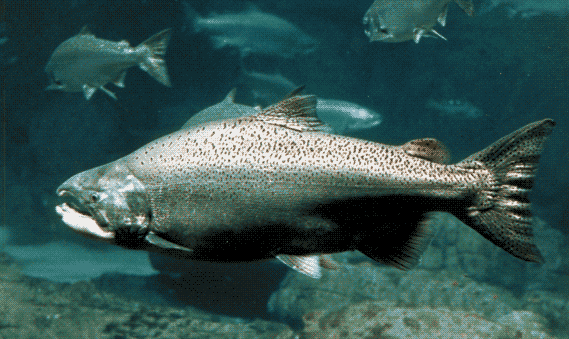Unimpressed with the environmental assessment the Food and Drug Association used to approve a new breed of genetically modified salmon destined for the American dinner table, a federal judge looked poised Tuesday to rule in favor of environmental groups afraid of its potential to blunt wild salmon populations.

Source: Courthouse News Service
At a hearing last Tuesday, U.S. District Judge Vincent Chhabria said he’s concerned that AquaBounty, the biotech company behind the GMO salmon, might use the FDA’s finding of “no significant impact” to expand the program without realizing its full impact on local ecology.
AquaBounty plans to breed its “AquAdvantage” salmon — a genetic mix of ocean pout and Pacific Chinook — at its hatchery in Rollo Bay on Prince Edward Island, then transport the eggs for growth at its Indiana farm site. That is, if litigation doesn’t stand in the way.
AquaBounty’s salmon, touted for its abnormally high growth rate, marks the first time the FDA has allowed a genetically modified animal to be raised and sold for food.
The FDA approved the company’s application to make and sell the genetically engineered salmon in 2015, spurring a lawsuit from the anti-GMO group Center for Food Safety and several environmental organizations and trade groups representing the fishing industry.
Chhabria said he wasn’t so sure that the FDA’s environmental assessment won’t set a precedent for approving future AquaBounty facilities.
“I’m not saying it opens the floodgates or sets the standards, but perhaps it pushes us in a direction and future agency action will likely be informed by this agency action,” he said. “Shouldn’t the FDA in this case have considered the fact that this was the first such facility and future decisions would be building on this facility?”
“AquaBounty has no guarantee that the FDA is going to accept whatever comes down the pike,” said Marissa Piropato, a justice department attorney representing the FDA.
She said Chhabria was asking the government to speculate on AquaBounty’s future plans, which it cannot do without a concrete proposal.
“You seem to be saying we should be sticking our heads in the sand because there are no concrete plans to build more facilities,” Chhabria said, adding that the FDA’s environmental assessment “is going to be their starting point for looking to regulatory approval for future actions.”
Lawyers for the environmental groups have the same concern. “Whatever they do here is going to inform the approval for those other applications and is going to inform what the FDA does for all GE animals going forward,” Earthjustice attorney Brettny Hardy said in a phone call Tuesday evening. “If the analysis they are doing here is inadequate that means it’s never going to be enough. It’s not going to get better.”
Environmental groups claim the FDA’s latest environment assessment from 2015 is already outdated and doesn’t adequately ensure the safety of wild Atlantic salmon that could be harmed by competition for food and interbreeding by their much larger genetically engineered brethren. They asked Chhabria to vacate it and order a more comprehensive environmental impact statement. Chhabria said he was inclined to reject the assessment and order the FDA to take a closer look at the project’s potential hazards, but did not issue a formal ruling Tuesday.
The FDA’s lawyers also gave Chhabria something else to consider: proposing that it actually doesn’t have the authority to approve or reject a drug based on its potential adverse effects on Atlantic salmon.
DOJ attorney Mary Englehart said the federal Food, Drug, and Cosmetic Act does not authorize the FDA to consider environmental impacts when approving a new animal drug application.
Chhabria said he could understand why the FDA might overlook a drug’s effect on trees, but he seemed genuinely befuddled why Atlantic salmon — unmistakably an animal under the FDCA — might fall outside the statute.
“Killing trees is one thing, killing salmon is another,” he said. “Even if you’re right about environmental effects generally, it doesn’t follow for me that you also cannot consider or act upon the risk that the salmon would be killed.”
To illustrate his point, Chhabria presented the outlandish scenario of 1,000 foot-long AquAdvantage salmon with razor-sharp teeth busting out of their man-made confines to “devour everything in sight and on the face of the Earth.”
Engelhart said the FDA doesn’t have the authority to revoke its approval in that situation, as it can only regulate the drug’s effect on the animal receiving it and the humans consuming the animal. If the genetically engineered salmon were to escape, they would be deemed unsafe and adulterated by the FDA, so the agency imposes restrictions on how the salmon are produced and distributed.
“If there’s a large chance of escape, that calls into question containment measures that would affect the integrity of the salmon,” she said.
Chhabria appeared astounded. “So you have the authority to protect the precious genetically modified salmon,” he said.
Engelhart said the legislative history of the FDCA shows that Congress did not intend the FDA to be responsible for evaluating a drug’s environmental risk.
A ruling in favor of the FDA on this point could invalidate the entire purpose of doing an environmental assessment. Hardy said the FDA could be misleading the public about its environmental review process if it lacks the authority to act on it.
“The public is going to think it’s looking at these environmental issues when they’re just putting together a bunch of window dressing,” she said.


















